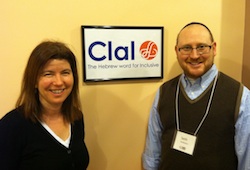By Emily K. Alhadeff, Assistant Editor, JTNews
This year, 90 rabbis from around the U.S. and across the denominational spectrum applied for 23 spots to be Rabbis Without Borders. Two of them come from Washington State.
Rabbi Beth Singer of Temple Beth Am in Seattle and Rabbi Seth Goldstein of Temple Beth Hatfiloh in Olympia were selected as 2011-2012 Rabbis Without Borders fellows. The yearlong program, a project of Clal, the National Jewish Center for Learning and Leadership, seeks to nurture rabbis as American religious leaders and to bring Jewish wisdom to a broader Jewish and non-Jewish public.
“It just struck me as a very intriguing idea,” said Goldstein from one of the learning sessions in New York this week. “It gives me new ways of thinking, and new tools.”
Singer admits she only had a vague idea of the program when she applied. She was also intrigued by the idea of the fellowship and wanted “to work collaboratively on the process to figure out what Judaism might look like moving forward,” as opposed to working with old models, she said.
Her first challenge came from Clal president Rabbi Irwin Kula and his vision for American rabbis: “For him, Rabbis Without Borders was the concept that traditionally, rabbis have spoken to their own communities. Judaism has gifts and wisdom,” she said. “He suggests that rabbis should be more out there in the public sphere, like Oprah, like people everybody listens to.”
Program director Rabbi Rebecca Sirbu explained that in present-day America, identities mix and change, and they would like rabbis to help people navigate those identities.
“If you look at what’s going on in terms of religion in America there are people who are searching for new places of meaning,” she said. In 2008 a Pew study found that 50 percent of the population polled had changed its religious affiliation over time.
“We’re living very much in a melting pot,” Sirbu said.
Singer, for example, noted the missed opportunity for Jewish religious leaders after September 11.
“Jews have so much historical experience with mass destruction. That would have been an appropriate time for rabbinic voices to be speaking to the nation” about healing and recovery, she said. “I don’t remember reading op-ed columns by rabbis in the New York Times or even in the Seattle Times.
“We’ve been so conditioned to talk to our own communities and not to bother the rest of the community too much,” she added.
The fellows meet in New York four times a year, and each conference revolves around a different theme. The first meeting focused on the sociology of religious identity in America today; the second — which took place this past weekend — focused on the intersection of technology and religion, including social media and gaming; the third meeting will deal with politics and religion; and the fourth will center around positive psychology.
“What increases people’s happiness?” asked Sirbu. The ideas generated from these conversations should influence how American rabbis approach Judaism in America moving forward.
Goldstein remarked that the shape of Jewish life is changing: “It’s not about the traditional hierarchical structures,” he said. It’s now about groups.
“It’s also about a new mindfulness, a new set of lenses,” he added. “We’re obviously changing how we relate.”
So what will happen to the traditional structure of the American synagogue as social networking changes the relational model?
“They augment each other,” Goldstein said. “They’re not replacements for each other.”
“You just can’t find everything you need online,” Sirbu said. “You still need an expert to turn to, to parse the information. That’s the role I think the rabbi can fill.”
Neither Singer nor Goldstein envisions becoming the next Shmuley Boteach or rabbi to the stars, however.
“When am I going to get the time to be an American spiritual leader?” asked Singer. Managing a 930-family congregation is a lot of work, she said.
“No one really needs to know Rabbi Beth Singer,” she said, but they do need to know about being made in the divine image, how that works in society, and how it speaks to Jews and non-Jews. The takeaway from this program will be different for every rabbi, which is Rabbis Without Borders’ intent, but that also makes it difficult to define.
“We don’t have a blueprint,” said Sirbu. “Instead we say, ‘You must do something in line with your vision for your rabbinate.’”
The organization, therefore, speaks to the values of pluralism and positivity, and it encourages rabbis to meet individuals where they are.
“We’re really hoping to rebrand rabbis,” Sirbu said, “so people see rabbis as great resources.”
